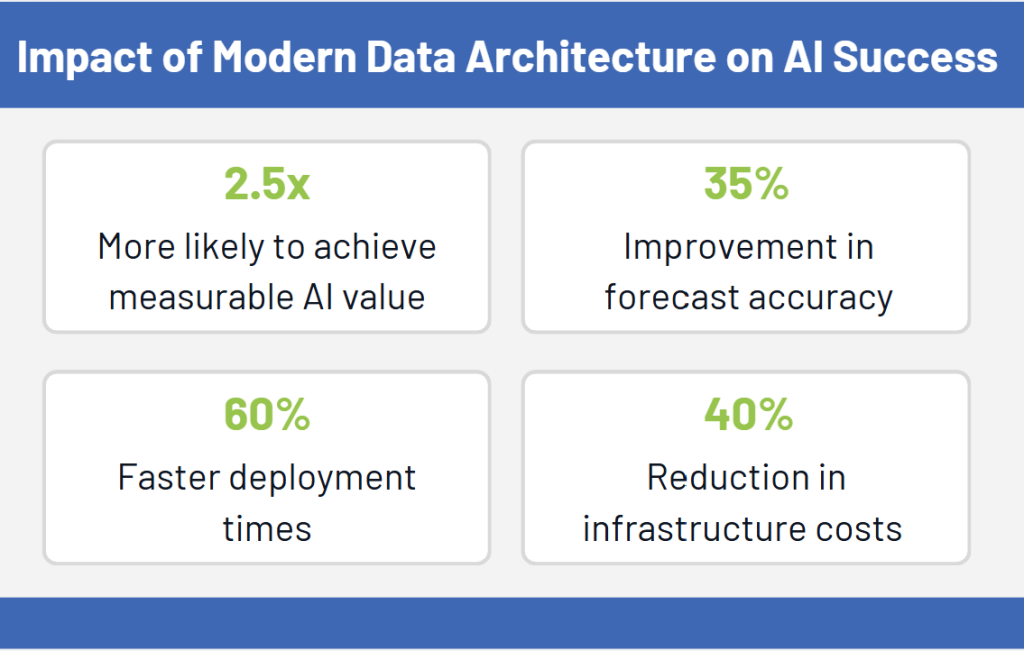Accelerating AI Implementation: How Project Experts Can Build Your AI-Ready Data Backbone
Key Takeaways
- Effective AI implementation depends on a secure, scalable, and well-governed data infrastructure.
- Project experts help modernize data architecture to handle large-scale, accurate data for AI applications.
- Investing in an AI-ready data infrastructure supports better analytics, innovation, and competitive advantage.
- GDH offers expert talent who understand how to align technology, people, and data for successful enterprise AI adoption.
AI is transforming how organizations solve business challenges, but success hinges on a solid foundation: the right data infrastructure. Many companies rush to adopt AI tools without making sure their existing systems can support them.
This blog explores how project specialists prepare businesses for AI implementation by building secure, scalable, and integrated data environments.
Why Strong Data Infrastructure Matters for AI Implementation
Most enterprises generate and store massive volumes of data every day—customer transactions, employee records, system logs, sensor readings, and more. Yet, AI models rely not just on the amount of data available, but on how well that data is prepared.
Data must be clean, structured, and accessible before it can fuel meaningful AI outcomes.
Clean data is free of duplicates and errors. Structured data is organized and labeled in predictable formats that make it easier to interpret. Accessible data is stored in a way that allows systems to retrieve and process it quickly, often in real time.
The value of AI models is dependent on the integrity of the data and the infrastructure behind it.
Enterprises that invest in robust data pipelines and governance gain an edge: Their data is accurate, compliant, and ready to generate insights that guide better decisions.
The Link Between Data Quality, Architecture, and AI Success
Inconsistent or siloed data can lead to flawed outputs. AI models need high-quality data, and a well-designed AI-ready data infrastructure enables consistent formats, clean inputs, and seamless access across systems. This is critical for generating reliable, usable output.
Avoiding the Pitfalls of Fragmented or Legacy Systems
Legacy systems often trap data in incompatible formats, while fragmentation slows AI development and increases error rates. Project teams help organizations modernize architecture and retire outdated systems that block AI implementation.

How Project Experts Support Enterprise AI Adoption
Modernizing infrastructure can be complex, time-consuming, and risky if done improperly. Experienced AI talent delivers crucial technical expertise and strategic oversight to help companies evolve without disrupting core operations or making costly mistakes.
Auditing and Optimizing Existing Data Systems
Project specialists begin by mapping data sources, identifying inefficiencies, and exposing gaps. This audit guides the development of a resilient AI data strategy aligned with enterprise goals.
Designing Scalable, Cloud-Based Storage, and Processing
Effective AI implementation relies on infrastructure that scales on demand, so IT talent designs cloud-native or hybrid systems that handle high-volume data workloads efficiently and securely.
Ensuring Governance and Security Best Practices
Compliance is critical, especially in healthcare, finance, and government. Knowledgeable AI specialists create governance frameworks that balance security, transparency, and accessibility.

Building an AI-Ready Data Strategy
AI readiness goes beyond tools. Success depends on aligning systems, people, and data around shared business outcomes. Project experts lead this alignment from strategy to execution.
Aligning Data Structure with Business Goals
AI should solve real problems, not just test capabilities. Project teams tailor infrastructure to use cases like fraud detection, customer insights, or supply chain optimization.
Integrating People Data and Work Data for Actionable Insights
To uncover enterprise-wide trends, organizations must combine HR, finance, customer, and operational data. Professionals in these roles unify these data streams into integrated systems that power smarter decision-making.
Related article: Navigating the AI Landscape: Solutions and Strategies for Real Business Challenges.

Why GDH Is Your Trusted Partner for AI-Ready Infrastructure
Implementing AI at scale demands more than new technology—you need a partner who understands how to connect people, processes, and platforms for real-world results. GDH brings two decades of experience helping enterprises modernize and secure their data environments while aligning them with strategic goals.
Our project specialists combine deep technical expertise with practical workforce and governance knowledge to design data backbones that can handle the demands of AI today—and adapt for what’s next.
From auditing legacy systems to deploying scalable, secure cloud solutions, GDH guides organizations through every stage of AI readiness.
If you’re looking to accelerate your AI journey with confidence, we’re ready to help you build the foundation that turns data into a competitive advantage.
Contact us to see how GDH’s experts can help you design, secure, and scale your AI-ready data infrastructure.
FAQ
What are the key benefits of hiring an external AI specialist?
External AI specialists bring specialized expertise in data strategy, infrastructure modernization, and AI deployment. They provide an objective perspective, helping to identify opportunities and challenges that internal teams may overlook. Project specialists also accelerate implementation timelines and ensure alignment between AI initiatives and business goals.
How do project experts assess our readiness for AI implementation?
Professionals in this role typically begin with a comprehensive audit of your existing data infrastructure, evaluating data quality, storage capabilities, and processing systems. They also assess organizational readiness, including staff competencies and existing workflows, to determine the optimal approach for AI integration.
What should we look for in AI talent’s experience?
Seek specialists with a proven track record in your industry and with projects similar in scope and complexity. Review case studies, client testimonials, and ask for references to gauge their ability to deliver results. Experience with specific AI technologies relevant to your needs is also crucial.
How do project experts ensure that AI solutions align with our business objectives?
Effective AI specialists work closely with stakeholders to understand strategic goals and operational challenges. They design AI solutions that address specific business problems, ensuring that technology adoption translates into measurable value.
What are the typical costs associated with hiring an external AI specialist?
Costs vary based on project complexity, duration, and the specialist’s expertise. Engagements can range from short-term assessments to long-term implementations. It’s important to discuss pricing structures, deliverables, and timelines upfront to ensure alignment.
How do project experts handle data privacy and compliance issues?
Reputable professionals in these roles prioritize data security and compliance with relevant regulations such as GDPR or HIPAA. They implement best practices for data handling, storage, and processing, and can assist in establishing governance frameworks to maintain compliance.
Can project specialists help with change management during AI adoption?
Yes, project experts often play a key role in facilitating organizational change. They provide training, develop communication strategies, and help manage the transition to AI-enhanced processes, ensuring that staff are engaged and prepared for new workflows.
How do we measure the success of an AI implementation project?
Success metrics should be defined at the project’s outset and aligned with business objectives. Common KPIs include improvements in efficiency, cost savings, revenue growth, and customer satisfaction. Professionals in these roles should provide regular progress reports and adjust strategies as needed to meet targets.
What is the typical timeline for an AI implementation project?
Timelines vary depending on the project’s scope and complexity. A pilot project may take a few months, while full-scale implementations can extend over a year. Specialists will provide a detailed project plan with milestones and deliverables to guide the process.
How do we ensure long-term sustainability of AI solutions?
Sustainability involves continuous monitoring, maintenance, and updates to AI systems. Project experts can help establish internal capabilities, provide training, and set up processes for ongoing evaluation and improvement to ensure that AI solutions continue to deliver value over time.








